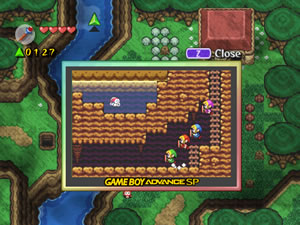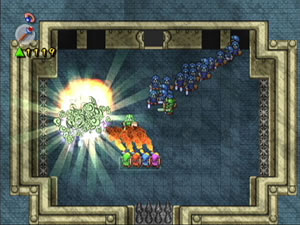Congratulations – you have quadruplets!
We all like to think of ourselves as unique individuals, but the fact of the matter is that somewhere in the world, there likely exists a twin for each and every one of us. I recently looked into this and, eerily enough, found someone with the exact same name as me from the exact
same hometown. I then stalked, er, researched him, found his resume, and discovered that for every fork in the road, he went left when I went right.
And if it weren’t for the restraining order, I’d find this guy, we’d become friends,
and go on adventures together, much like in The
Legend of Zelda: Four Swords Adventures, the Gamecube’s latest GBA
link-up multiplayer game. Incidentally, it’s also the best use of GC/GBA connectivity
so far.
The plot is classic Zelda. An evil sorcerer has kidnapped the Princess and six maidens, and as always, it’s up to Link to save them all. This time, he grabs the “Four Sword,” which splits him up into four Links of varying colors. This new uber-quartet then roams the land in an effort to restore the kingdom.
Four Swords Adventures was originally found as a small multiplayer
mode in the GBA game The
Legend of Zelda: A Link to the Past, and as such is clearly designed
first and foremost as a multiplayer game. The primary mode, Hyrulean Adventure,
does not have a large scale overworld like most Zelda games.
Instead, you progress through different worlds via map screens. Each world is
made up of several levels, and the four players spend their time collecting weapons,
items and power-ups while working together to solve puzzles or working against
one another to score cash.
Each Link can hold a different weapon, including classic Zelda power-ups like bombs, arrows, and the flame torch. Instead of normal rupees, Four
Swords Adventures distributes power gems, which give strength boosts. This gives the game a competitive edge, as players try to grab more money than the others.
Unfortunately, the weapons and power-ups aren’t persistent. At the start of each level, everyone is back to square one. This is something of a downer, because power or skill retention really heightens the competition.
Four Swords Adventures stands in contrast to Final
Fantasy: Crystal Chronicles,
which took advantage of each player’s individual GBA screen to control spell
settings and items during the game. In Four Swords Adventures, the GBA screen
isn’t used for settings. Instead, whenever one of the four Links drops away
into a dungeon or house, he disappears from the main screen and pops up on
the individual GBA screen. In this sense, two Links can be off exploring one
area while two others chat up some NPCs in another. It’s a smart, fun use of
the GBA connectivity.
 Crystal
Crystal
Chronicles had a lackluster single-player game, which ultimately doomed it from
the start. Four Swords‘ single player is surprisingly decent and doesn’t require a GBA. When you use a normal controller, the dungeons are just shown as an overlaid screen.
In the single player mode, you control the four Links at once, but only the first Link will take battle damage. The order of the various Links can be alternated, similar to The
Lost Vikings character switching setup. The three Links you aren’t using will remain stationary and immune to damage, though here’s also an option to organize the four Links in several battle patterns, including vertical and horizontal rows, a square and a powerful diamond (back-to-back). While in a battle formation, each Link takes on damage, but the formations allow you to push heavy blocks in unison, crucial for solving many of the game’s puzzles.
In addition to the Hyrulean Adventure, there’s also a multiplayer versus mode called Shadow Battle. The individual GBA screens work well here, when all the different Links go into ninja mode, hiding out to catch their doppelgangers unaware. It’s not nearly as exciting as the main game, but does offer some extra incentive.
Graphically, Four Swords Adventures is an odd mix of cheap 2D SNES sprites and nice Gamecube particle effects. It looks a lot like the GBA game, but now wears fancier pants and shows off upgraded visual flourishes, like Wind
Waker style curly-Q air poofs. Still, much of the technology has clearly been ported over from the GBA, creating an inconsistent feel.
 The music, however, will be instantly familiar to Zelda fans. Borrowing liberally from the Wind
The music, however, will be instantly familiar to Zelda fans. Borrowing liberally from the Wind
Waker, the sounds reprise classic Zelda tunes and work perfectly to set the mood.
As a pleasant bonus, a GBA link cable is included with the game, but to really
encourage this GBA connectivity feature, Nintendo should pack a link cable
with every GBA sold. Like Crystal Chronicles, it requires all players to be
using GBAs as their controllers, which does limit the game’s appeal. For that matter, Four
Swords Adventures would have been a terrific online game, but Nintendo just refuses to go that way.
There’s no question that The Legend of Zelda: Four Swords Adventures handily
trumps Final
Fantasy: Crystal Chronicles as the best example of Nintendo’s connectivity
plan and serves up some fun multiplayer gaming. However, the required use of
the GBA for multiplayer does limit the play potential. Provided
you have the friends and the hardware for it, though, these Four
Swords have one bright future.







